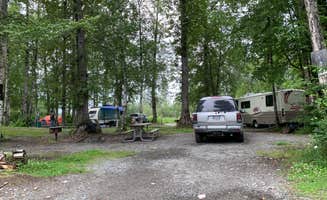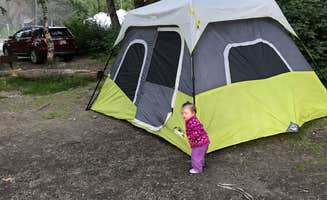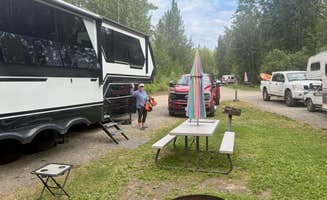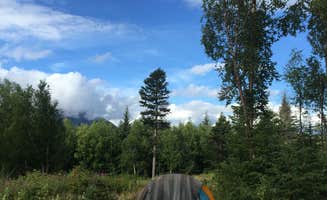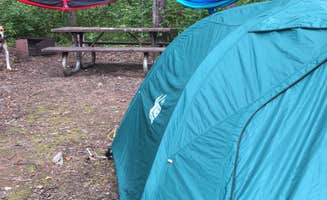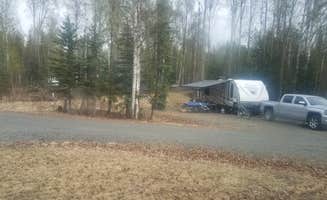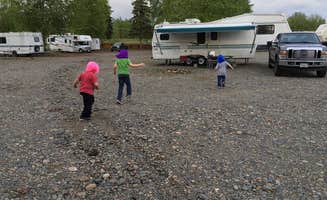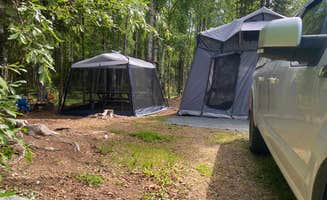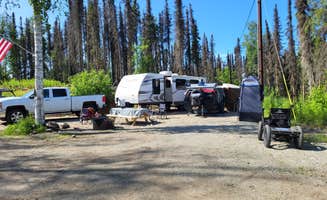Dispersed camping near Trapper Creek offers opportunities along riverbanks and forest areas with varying access requirements. The Susitna River Banks provide free primitive camping with straightforward access from the bridge, though visitors should expect noise from recreational vehicles. Campsites throughout the region range from wooded tent sites to lakeside spots with mountain views, and most remain open from May through September. Winter camping options are severely limited due to extreme weather conditions and limited road maintenance.
What to do
Fishing at Montana Creek Campground: Located 20 miles south of Trapper Creek, this site provides direct creek access for anglers. "This is a great place to stop and fish and look for wildlife. Amazing views, trees, and FISH," notes reviewer Brad B. Montana Creek is particularly known for fall silver salmon runs and offers hiking trails to the Susitna River confluence.
Kayaking on Byers Lake: Byers Lake Campground offers lake recreation with boat rentals and fishing opportunities. "My wife and I love to kayak this lake. It also boasts great fishing," reports Jonathan V. The lake contains trout and even grayling according to reviews, with a trail circling the entire lake for hikers.
Hiking at K'esugi Ken Campground: Several trail systems connect directly to the campground with varying difficulty levels. "Trails with amazing views of Denali," writes Connor D. A reviewer noted, "Out of all the AK state parks I've visited this is by far the best. I also prefer this over Denali NPS, I find I have better luck seeing Denali from this side but also tons less people."
What campers like
Wildlife viewing: Early morning and evening hours provide the best opportunities for wildlife spotting in the Trapper Creek area. At Byers Lake Campground, one camper encountered "swans and moose" while kayaking, while others report regular sightings around campgrounds throughout the region.
Mountain visibility: Clear days offer remarkable Denali views from several campgrounds. "The weather was in our favor in August and we had an awesome view of Denali right from our campsite," reports a K'esugi Ken Campground visitor. Weather conditions vary significantly; mornings typically provide the clearest mountain views before afternoon clouds develop.
Rustic cabin options: Several campgrounds offer cabin rentals as alternatives to tent camping. "Stayed in the cabins, they were on the rustic side but still relatively modern," writes Dan N. about Byers Lake Campground. K'esugi Ken Campground features cabins with wood stoves and loft sleeping areas.
What you should know
Limited services: Most campgrounds have minimal amenities and spotty utilities. At K'esugi Ken Campground, a camper noted: "No water hookups at site. Currently as of AUG21 only one functioning water spigot at the pay station." Plan accordingly by filling water containers before arrival.
Seasonal considerations: Campground facilities typically operate between May and September. "Growing up in the Midwest and camping at state parks I'm use to a lot of interpretive signage explaining the history and landscape," notes SJ D. about K'esugi Ken Campground, which offers ranger programs during peak season.
Noise factors: Highway proximity affects some campgrounds. Montana Creek Campground reviewer Sierra S. mentions, "It is located right next to the Parks Highway which can be loud and busy with tourists and semis in the summer." At Susitna River Banks, "Unfortunately four wheelers, dirt bikes and fireworks are going to be buzzing and booming all night," according to Austin K.
Tips for camping with families
Spacious sites for multiple tents: Some campgrounds accommodate larger family groups better than others. Lisa M. describes K'esugi Ken Campground: "We camped here in July 2019 and we had two families. We had tons of space for a 30ft trailer and two trucks and we liked that there was a small grass area for a tent."
Educational programs: Several state park campgrounds offer ranger-led activities during summer months. "Ranger talks nightly," mentions Shadara W. about K'esugi Ken. These programs typically cover wildlife, geology, and park history, providing educational opportunities for children.
Campground layout considerations: Family-friendly site selection involves evaluating privacy and amenities. At Montana Creek Campground, "There are nicely wooded secluded spots with no hookups, some wide open spots with hookups available up front but no privacy," reports Shadara W., suggesting families consider which factors matter most.
Tips from RVers
Site selection challenges: Finding appropriate RV sites requires advance research. At Talkeetna RV & Boat Launch, Kerry B. notes: "The RV area is mostly in the trees and a few places are defined, but a lot is just pick your spot and park where you can fit. The places along the water will need to be shorter rigs or you would need to park parallel."
Electric hookups without water: Several campgrounds offer partial hookups only. A visitor to K'esugi Ken Campground reports: "There is power to all the RV campsites but only a couple of water stands. The water supply stands were covered in plastic with no explanation." RVers should arrive with full water tanks.
Maneuverability concerns: Larger RVs face access challenges at some of the best places to camp near Trapper Creek, Alaska. "It is heavily wooded and would be difficult to maneuver with a larger RV or toy hauler," writes Erik J. about Montana Creek Campground. RVers with units over 30 feet should call ahead to confirm access.



